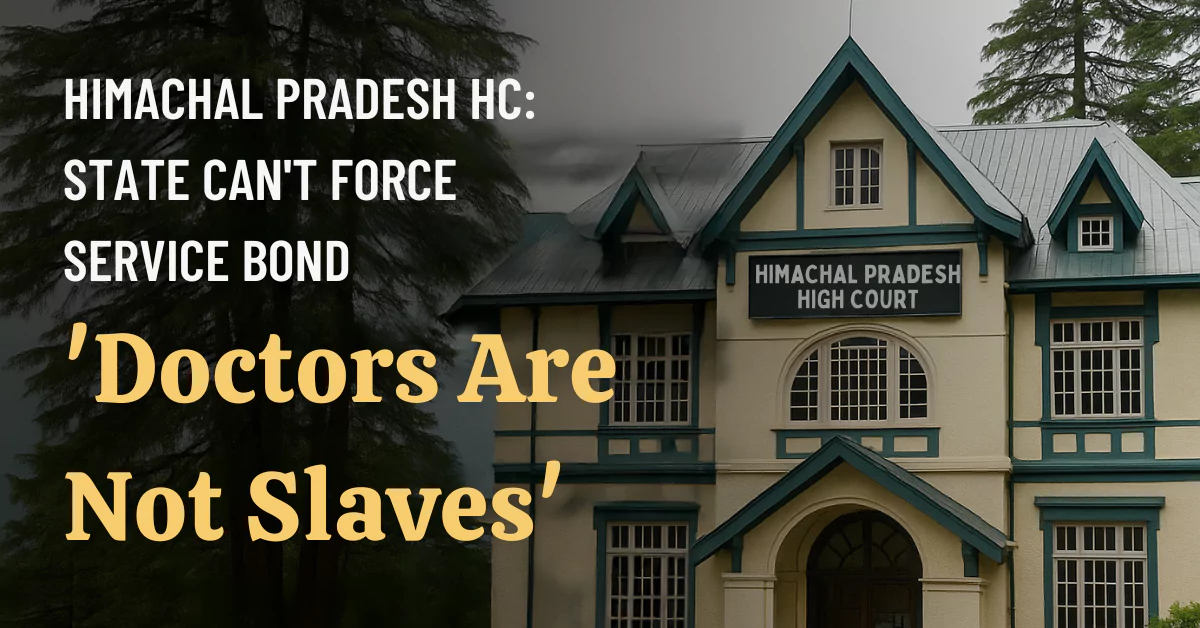Himachal Pradesh High Court: In a landmark judgement, the Himachal Pradesh High Court ruled that if doctors paid their bond amount as per the rules, the government could not force them to serve. It will have a big impact on medical service bonds across India. The High Court emphasised that doctors are “not slaves of the state” and cannot be forced into compulsory service beyond the legal and contractual framework.
The HC observed “the Doctors are not slaves, they are only required to serve that case, in case they are willing to abide by the terms of the bond, once the respondents have opted to pay the bond amount then the State essentially has no authority to withhold the No Objection Certificate (NOC) as well as the certificates/documents of those of the respondents”
Background of the Case
The case was filed by a Senior Resident Doctor who challenged the government’s decision to enforce compulsory rural service despite the fact that they had already deposited the bond amount as per their educational agreements. The state government argued that despite the payment of the bond, doctors were needed in rural health facilities due to staff shortages, and thus their physical service was essential.
Himachal Pradesh HC: Key Observations
- Freedom of Profession:
The court stated that forcing doctors into service after the fulfilment of their bond (monetarily) violates their constitutional right to practice a profession of their choice under Article 19(1)(g) of the Indian Constitution. - Contractual Obligation Ends After Bond Payment:
The court ruled that the relationship between the state and the bonded doctor is strictly contractual. Once the bond amount is paid, the government cannot impose any further service conditions on the candidate. - Human Dignity Cannot Be Compromised:
Referring to constitutional principles and past judgments, the court said, “Doctors are not bonded labourers or slaves. They cannot be treated as if their freedom can be compromised for state interest beyond the terms of the bond.” - Balance of State Interest and Individual Rights:
While acknowledging the shortage of doctors in rural and semi-urban areas, the court asserted that government policy cannot override fundamental rights once the bond’s terms have been legally settled.
Impact on Medical Students and Doctors
- Relief to MBBS/PG Graduates:
This verdict comes as a huge relief to thousands of medical graduates in India, especially in states like Maharashtra, Karnataka, Tamil Nadu, and Madhya Pradesh, where rural service bonds are compulsory for medical and post-graduate medical courses. - Bond Buy-Out Option Strengthened:
The ruling clarifies that paying the bond amount is a legitimate and final way to exit government service obligations. This will help doctors who wish to pursue super-speciality courses, research fellowships, or private practice without being forced into undesired rural postings. - State Health Policy Implications:
State governments may need to rethink their rural healthcare staffing models. They might need to introduce incentive-based rural postings instead of compulsory bonds that infringe upon personal liberty.
Legal Precedents Cited
- The court referenced previous Supreme Court rulings that stress the importance of individual freedom over state employment requirements once contractual obligations are fulfilled.
- The judgment reaffirms that bonded service cannot become a form of state-enforced labour, drawing parallels with cases related to bonded labour and forced employment.
Government’s Possible Next Steps
- Appeal Likely:
Legal experts suggest that the state government may challenge this ruling in the Supreme Court, especially as it impacts health policy and rural medical staffing. - Policy Revision Needed:
Health departments may need to design voluntary rural service schemes with attractive financial or career incentives rather than coercion through service bonds.
Experts’ View
Dr. Rajesh Sharma, legal consultant for medical education policies, said:
“This verdict marks a major victory for doctors’ rights. States will now be under pressure to rethink how they ensure rural healthcare without violating doctors’ constitutional freedoms.”
This crucial High Court decision highlights the tension between state healthcare needs and individual rights. While the government’s intention to fill rural medical vacancies remains justified, it cannot do so by overriding legally binding agreements once candidates fulfil their bond terms.

